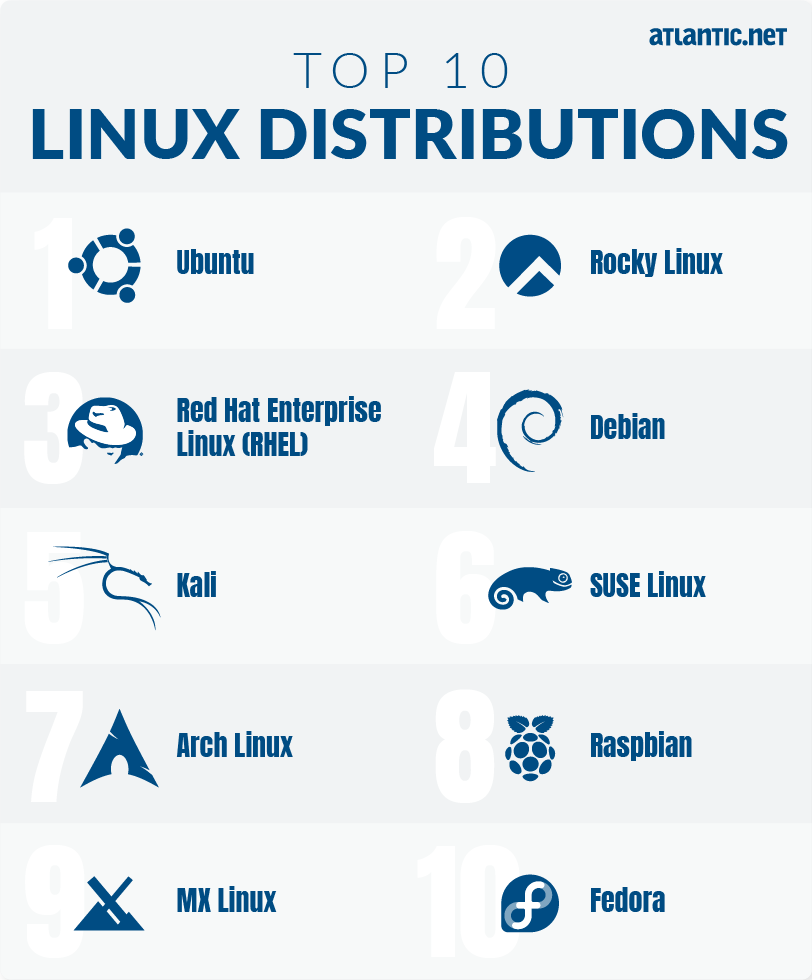The Linux Operating System is one of the most popular OSes available today and is built into a huge number of products you may not have expected to find it in. The Android Smartphone software runs on the Linux Kernel, and macOS runs on a heavily modified version of Unix (which is also based on the Linux Kernel).
Linux thrives in the business server market and is heavily utilized in Cloud Computing. It’s frequently used for virtual cloud instances, Kubernetes clusters, and Docker Containers due to being lightweight and super reliable.
What is a Linux Distro?
Linux is available in a wide variety of distributions, or distros as they’re commonly known, and each is based upon the Linux Kernel. This is the brain of the operating system that manages the underlying hardware. The distro is the software wrap-around that the user interacts with, commonly a command-line interface, but it is also available as a GUI (such as GNOME or KDE).
Each Linux distro is streamlined for a particular use case. The overwhelming majority are open-source, meaning that the distro is built and maintained by the community and that they are all free (with the odd exception). Remember that many of these distros are available as 1-click applications on the Atlantic.Net Cloud.
Here is our top 10 list of Linux distros:
Top 10 Linux Distributions
 1. Ubuntu
1. Ubuntu
Ubuntu is probably the most popular Linux distribution available right now. It comes in two flavors: a server core version, perfect for command-line ninjas, and a hugely popular Ubuntu Desktop edition. Ubuntu is arguably the biggest Linux competitor to Windows, but unlike the Microsoft product, it’s completely free.
Paid support options are available for businesses with Canonical Advantage, a support package that provides extended security maintenance, Kernel Live patching (upgrades without reboots), and enhanced crypto security to name just a few of its offerings. Combine this with a huge catalog of free software, excellent reliability, and an exceptionally helpful community, and Ubuntu is right up there with the very best.
You can deploy various versions of Ubuntu Linux on the Atlantic.Net Cloud right now. Including 1-Click Apps that launch in under 30 seconds – click here to find out more.
 2. Rocky Linux
2. Rocky Linux
Rocky Linux has quickly become a firm favorite in the Linux community, and its popularity with the enterprise is growing rapidly. Rocky only started development in December 2020 after Red Hat announced its discontinued support for CentOS downstream in favor of a more divisive upstream model. This might not sound like a big deal, but it essentially means that CentOS is going to be used as a pre-release testing platform for RHEL, absolutely not what is needed for an enterprise product. The result? Rocky Linux!
The aim of Rocky Linux is to provide a business-grade operating system that has fully validated updates and applications available that are tested for compatibility and stability prior to release. The initial signs are very good, with the first general availability release being well-received, gaining sponsorship of AWS, Azure, and Google Cloud, to name just a few adopters.
Want to try Rocky Linux? You can spin up Rocky Linux 8.4 directly from the Atlantic.Net cloud console.
 3. Red Hat Enterprise Linux (RHEL)
3. Red Hat Enterprise Linux (RHEL)
Red Hat is the most popular paid version of Linux. RHEL is part of a much larger Red Hat ecosystem created for business applications. Red Hat is the leader in open-source software development and has debuted some game-changing applications such as Ansible, OpenStack, OpenShift, and LibreOffice.
Red Hat’s biggest appeal is the technical support provided for businesses. All Red Hat-provided software repositories are certified for Red Hat, meaning that any issues you encounter will be resolved as part of your support package. The good news is that the OS is bulletproof with exceptional reliability.
 4. Debian
4. Debian
Debian GNU Linux was started way back in 1993 and is a popular server Linux distribution. Debian is also what the Ubuntu OS is based upon and it is just as easy to use with either the command line or any of the desktop environments available. Debian’s biggest draw is its hardware compatibility; it will run on basically any architecture out there. Debian is extremely stable, and you can tweak just about every setting you can imagine.
Want to try Debian now? You can spin up versions 8,9,10 and 11 directly from the Atlantic.Net cloud console.
 5. Kali
5. Kali
Kali Linux is a specialist digital forensics edition of the Linux Kernel and a firm favorite of security professionals and ethical hackers. It’s all about penetration testing and security, with an extensive library of tools built in such as AircrackNG, Metasploit, John the Ripper, Nessus, Nmap, SQLMap, and Wireshark – each designed to spot vulnerabilities in a local attached networked server environment.
 6. SUSE Linux
6. SUSE Linux
Founded in 1992, SUSE Linux is a paid Linux distro targeted at enterprise and cloud providers that want to run mission-critical applications with exemplary stability. SUSE is very popular for SAP data processing applications, HA Clustering, and Retail Point of Sale devices. Like Red Hat, SUSE has its own versions of OpenStack, Kubernetes, and containerization tools.
 7. Arch Linux
7. Arch Linux
The goal of Arch Linux is to create a fully functioning Linux Distribution with a lightweight footprint that is easy to use. Arch uses the Pac-Man software distribution tool that tracks and maintains its low-profile applications. The end result is a really quick, lightweight operating system that can be tailored to the exact workload needed – there is no excess baggage with Arch Linux.
Want to try Arch now? You can spin up Arch Linux 64-bit directly from the Atlantic.Net cloud console.
 8. Raspbian
8. Raspbian
Raspbian (or Raspberry Pi OS as it’s officially known) is a Debian-based OS for the Raspberry Pi for single board ARM CPUs. It is a super lightweight OS design to fit on an 8 GB SD Card. If you own a Raspberry Pi, be sure to check out Raspbian to truly unlock the potential of the Pi.
 9. MX Linux
9. MX Linux
For those of you looking for a slick desktop experience that rivals the popular Windows 10 experience, check out MX Linux. It’s incredibly easy to use and looks clean and well presented. It comes preloaded with office suites, email clients, photo software, video software, even music players – everything you need, and it’s completely FREE!
 10. Fedora
10. Fedora
Fedora is owned by Red Hat, but is a completely free version but almost identical to RHEL in every way. Its GNOME revisions are targeted at users of Windows and macOS who want to break free of the restrictions of proprietary operating systems. It represents a perfect middle ground for the user who wants not only great performance but also access to the latest cross-compatible software.
 What about CentOS?
What about CentOS?
You may be wondering: why we haven’t included CentOS? This is because in 2020 it was announced CentOS Linux is being discontinued and replaced with CentOS Stream, a developer-focused distribution for Fedora and Red Hat Enterprise Linux. As a result, CentOS Linux 8 will go end-of-life on December 31st, 2021.
 How Can Atlantic.Net Help?
How Can Atlantic.Net Help?
Are you looking for a leading hosting provider to host your Linux Operating System? Look no further than the Atlantic.Net VPS hosting service. With over 25 years of proven experience, our full suite of managed services and always available professional support team can host your mission-critical Linux workload.
Our Cloud Platform has many of this Top 10 available as 1-Click applications, meaning you can spin up a fully configured server in about 30 seconds. You can also bring your own license if you want to use SUSE or Red Hat. Our platform is super flexible and built around your needs.
For faster application deployment, free IT architecture design, and assessment, visit us at www.atlantic.net, call 888-618-DATA (3282), or email us at [email protected].
You can find out more information by contacting our sales team today!

 1. Ubuntu
1. Ubuntu 2. Rocky Linux
2. Rocky Linux 3. Red Hat Enterprise Linux (RHEL)
3. Red Hat Enterprise Linux (RHEL) 4. Debian
4. Debian 5. Kali
5. Kali 6. SUSE Linux
6. SUSE Linux 7. Arch Linux
7. Arch Linux 8. Raspbian
8. Raspbian 9. MX Linux
9. MX Linux 10. Fedora
10. Fedora What about CentOS?
What about CentOS? How Can Atlantic.Net Help?
How Can Atlantic.Net Help?